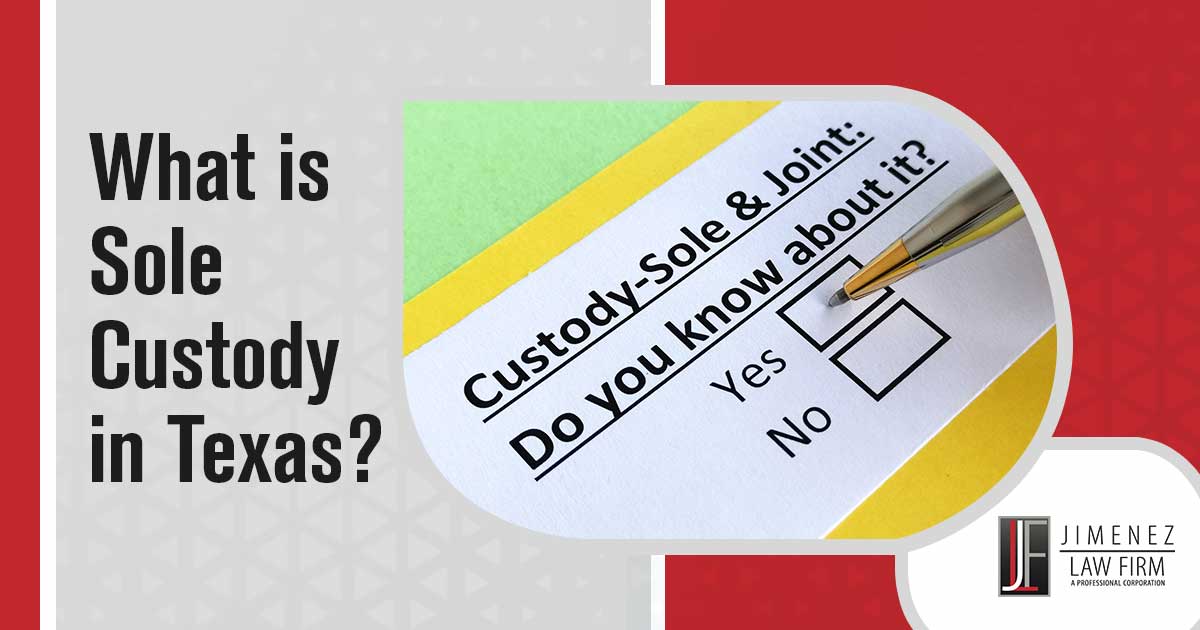Sole custody is when one parent is awarded full legal and physical custody of the children. Joint custody is when both parents share legal and physical custody of the children.
Which type of child custody is best for your family? That depends on your individual situation. Here we will explore both types of child custody in more detail to help you decide which is right for you.
What is Sole Custody in Texas and how is it different from Joint Custody?
In Texas, sole or full custody gives one parent full legal and physical custody of the children. This means that one parent has the right to make key decisions about the child’s upbringing including medical care, education, religious instruction, and general welfare. The other parent is given visitation rights but typically does not have any decision-making authority over the child unless they are granted joint legal custody.
Joint custody, on the other hand, is when both parents share equal legal and physical custody of the children. Both parents have equal decision-making power over their child’s well-being including medical care, education, religious instruction, and general welfare. The amount of time each parent spends with the child will depend on what is stated in their custody agreement.
When is Sole Custody granted in Texas and what are the benefits of having Sole Custody over Joint Custody?
Sole child custody in Texas is generally granted when one parent has been deemed unfit to have any legal or physical custody of the child. This could be due to a criminal record, substance abuse issues, a history of neglect or abuse, domestic violence, or other factors that make the parent unsuitable for shared custody. In certain cases, sole custody may also be granted if both parents and the court agree that it is in the best interest of the children.
Whether you are facing divorce and considering your child custody options or looking for ways to modify an existing agreement, it’s important to understand all your options. By familiarizing yourself with sole custody in Texas as well as joint custody, you can make an informed decision that is best for your family.
No matter which type of custody you and the court ultimately decide on, it’s important to remember that the goal should always be to make sure that both parents are able to work together in order to ensure the well-being and best interests of the children involved. Working with an experienced attorney can help you create a parenting plan and custody agreement that works for everyone involved.
Sole custody may not be right for every family, but it is an option available for those who feel it is in their child’s best interest. It is important to consider all of your options before making a final decision so you can make sure your child will have the secure and loving home that they need during such a difficult time.
How can you get Sole Custody in Texas and what kind of evidence will the court consider when making a decision?
To get sole custody in Texas, you must file a petition with the court and prove that it is in the best interest of your child. The factors taken into consideration when making this decision include the age and sex of the child, the relationship between each parent and the child, any history of domestic abuse or neglect, if either parent has been convicted of a crime within five years of filing for custody, as well as other factors.
If you are considering filing for sole custody in Texas, it’s important to consult an experienced attorney who can help guide you through the process. Gathering evidence and presenting it to the court requires skill and experience so make sure you have someone on your side who knows how to do this effectively.
How does a parent lose custody of their children in Texas and what are the consequences for doing so?
In Texas, a parent can lose custody of their children for various reasons. These may include neglect, abuse, failure to provide adequate care or supervision, or if the court finds that it is in the best interest of the child to be placed in another home. If a parent is found guilty of these offenses, they may face serious consequences such as fines and even jail time. It’s important for both parents to understand their rights and responsibilities when it comes to raising their children so they can avoid any negative repercussions.
If you are facing a potential loss of custody due to any of these offenses, it’s important to contact an experienced lawyer who can represent you in family court and help protect your rights throughout the process. An attorney can look at the evidence and ensure that all your rights are protected to ensure your child is placed in a safe, stable home. Seek legal advice as soon as possible so you can protect yourself and your rights throughout the process. Remember that ultimately, the goal should always be to provide a safe and loving environment for your children.
What are some tips for avoiding Sole Custody in Texas?
When going through a divorce or dispute regarding custody in Texas, there are some key steps you can take to help avoid having sole custody granted:
- Create an amicable parenting plan with your ex-spouse that works for both of you and focuses on the best interests of your children.
- Always act in a manner that is respectful towards your ex-spouse, even when it’s difficult to do so.
- Be open to compromise and negotiation when possible.
- If disagreements arise, seek out the help of a mediator or family law lawyers who can help guide you through the process.
- Attend parenting classes or seek counseling if needed to better understand your rights and duties as a parent.
By taking these steps, it is more likely that any custody dispute can be resolved without either party having to resort to sole custody. It’s important to remember that when deciding what is in the best interest of your children, it’s important to consider both parents and try to reach a solution that is beneficial for everyone involved. Additionally, seeking out the help of an experienced attorney can also help protect your parental rights and ensure any parenting plan or agreement put in place is in their best interests.
What are some common misconceptions about Sole Custody in Texas?
One of the most common misconceptions about sole custody in Texas is that it gives one parent complete control over the child. This is not true; even in sole custody arrangements, both parents still have rights and responsibilities when it comes to their children. Another common misconception is that sole custody grants a parent full financial responsibility for their children. While this may be true in some cases, it’s important to understand that they will still be responsible for providing any necessary support or care to the child regardless of who has legal custody. Finally, another common misconception is that sole custody means one parent will have all visitation while the other parent has none; again, this is false as both parents still have access to the child unless there are extenuating circumstances preventing them from doing so.
It’s important to remember these misconceptions when considering sole custody in Texas to understand the legal rights and responsibilities of both parents before entering into any arrangement. An experienced attorney can help explain your rights and ensure that any agreement put in place is in the best interests of the child.
Know when to ask for legal help
Understanding sole custody in Texas can be complicated. Seeking out the help of an experienced lawyer can assist in making the process easier. It’s important to remember that regardless of which parent has custody, both have legal obligations when it comes to their children; this includes providing financial child support and access to necessary care or services. Additionally, it’s important to remember common misconceptions about sole custody arrangements so you can better understand what rights and responsibilities each parent may still have. By taking these steps, you can help ensure your children are well cared for regardless of who has legal custody.
In summary, sole custody in Texas is a complicated issue and it’s essential to understand all the rights and responsibilities involved before entering into any agreement. It’s best to always seek out the help of an experienced family law attorney so that both parties can reach a mutually beneficial arrangement that meets their needs and puts the child’s best interests first. Additionally, understanding common misconceptions about sole custody can help guide conversations between both parents when discussing any potential arrangement or parenting plan. Ultimately, taking the necessary steps to avoid sole custody whenever possible helps create a safe environment for everyone involved in the process.
Knowing when to seek help
Custody disputes in the state of Texas are taken seriously. It doesn’t matter if your case is for sole custody or joint custody, if you’re the sole managing conservator, possessory conservator, or have a different role. In any case, it’s important to hire an experienced child custody law firm or lawyer from a respectable law office.
Here at the Jimenez Law Firm, our attorneys are familiar with Texas law and the Texas Family Code. We help our clients through the difficulties of Texas family court, assist with temporary orders, exclusive rights, and more for every mother or father we can. Establishing possession and a conservatorship that aligns with your child’s best interests is vitally important.


